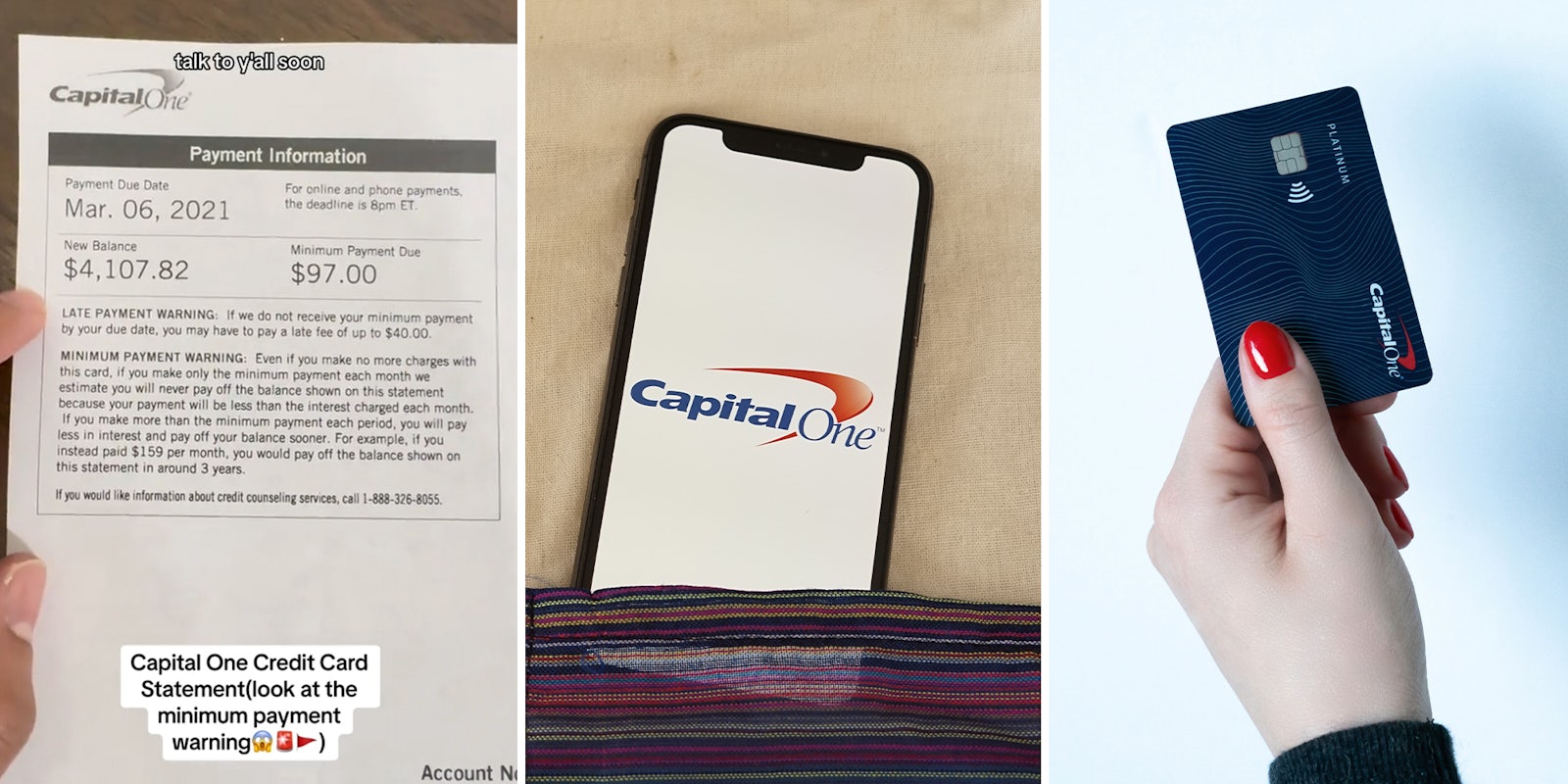After making big purchases on a credit card, it can be tempting to simply make the minimum payment. If one doesn’t have enough money at the moment, or just needs a little extra time to get funds together, paying a credit card minimum could be seen as a way to still contribute to paying off the debt while not sacrificing a substantial amount of money.
However, doing this has significant downsides, says TikTok user Kenneth Smith Jr. (@ksmithcredit) in a video with over 1.3 million views. To explain why, Smith shows a credit card statement from Capital One that has a balance of $4,107.82. The minimum payment for the bill is $97.
“Now, look at the minimum payment warning,” he states. “This is on every credit card statement, by the way. It’s required by law.”
He then reads out a summary of the minimum payment warning: “Even if you make no more charges with this card, if you only make the minimum payment each month, we estimate you will never pay off the balance shown on this statement because your payment will be less than the interest charged each month.”
“If you make more than a minimum payment each period, you will pay less than interest and pay off your balance sooner,” he continues. “For example, if you instead pay $159 per month, you will pay off the balance shown on this statement in around three years.”
Given that the average American has around $5,000 in credit card debt, with some holding substantially more debt, Smith says that only making minimum payments can lock one in a cycle of debt. Therefore, instead of paying the minimum, Smith’s advice is simple.
“At the end of the day, you never want to do the minimum payment on your credit card. Super important to always pay more,” he states. “Really and truly, with your credit cards, you want to pay off the balance in full each month.”
In the comments section, users shared their own minimum payment stories.
“I have a screenshot of a 20k credit card I had 5 years ago that said it would take 123 years of minimum payments to pay off,” wrote a user. “It’s paid off now.”
“Wow that’s harsh lol,” added another. “I just read mine and it says it’ll take me 86 years to pay off.”
“Read this on my discover card after using it for a large purchase.Said min payment on $6k would take 25 years to pay off,” stated a third. “It feels criminal at that point.”
@ksmithcredit Never just pay the minimum payment on your credit card! You always want to pay your credit cards off in full each month. I do understand that things happen, and sometimes credit card debt may rack up, if this is the case, and you need help getting out of it, go to the link in my profile, and fill out the form! #debtrelief #debtconsolidation #creditcard #capitalone #minimumpaymentwarning ♬ original sound – Debt Consolidation
Others simply offered their credit card purchase practices.
“I use mine like a checking account and pay it off every pay period,” explained a commenter. “They pay me over $1000 a year in travel rewards.”
“I pay it off every month, in full. It’s a great feeling,” detailed another.
“This is why I’m happy using affirm or afterpay. To limit my spending and guarantee I can pay off my items,” shared a further TikToker.
Update 6:35am CT, Jan. 15: In an Instagram DM exchange with the Daily Dot, Smith explained the purpose behind minimum payments.
“I believe it does provide consumers with a way to be able to make payments on their debt if they can’t pay it back in full,” he stated. “But, it does become predatory if the consumer can never pay off the card by just doing the minimum payments. I think it’s a way of creditors taking advantage of the situation and capitalizing on people’s ignorance. It’s a massive money maker for creditors.”
He went on to share how those in such debt can begin to get out of it.
“Step one is to really evaluate your finances to see if paying double or triple the minimum payment is feasible,” he shared. “If not, I would recommend looking into alternative ways to get out of debt such as consumer credit counseling, debt settlement, or bankruptcy…They could also look into doing a credit card balance transfer or a consolidation loan as an alternative way to get out of debt.”

